
Tributes
Sotigui kouyate: son of africa and citizen of the world
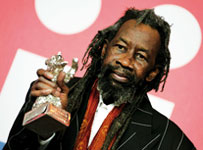
This is how late Sotigui Kouyaté liked to describe himself, before he passed away discreetly this spring. Rooted in his Africanity, serene in his relationship with otherness, Kouyaté led many lives as a sort of ideal incarnation of a dignified Africa reconciled with its history, faithful to its memory and open to all peoples.
Reducing a man to his filmography is like building a house without foundations, used to say Kouyaté. It is also like using a persistent cliché to say that thanks to the fame attained in the West, an African artist is born. Before becoming an actor, Kouyaté, born of a long line of griots (storytellers), was a poet, musician/storyteller and dancer. He was also a professional soccer player and Captain of the Burkina Faso national team in 1966. It is difficult to understand him without taking into account all the other lives he led which naturally brought on the consecration of the last twenty-five years of his life.
His film debut dates back to the 70s when Mustapha Alassane gave him his first important parts on the big screen.
The meeting with Brook and “Mahabharata” in 1984 when Kouyaté was forty-eight years old, gave him the decisive impetus to pursue a career in theatre and film. Thanks to this human encounter, Kouyaté found a resonance to what he had always been looking for, the possibility of reaching universality through art, to go beyond the narrow borders between cultures, races and religions.
It is the image of a wise man with a wealth of many lives that is presented by the films in the tribute paid to this monument of African cinema by Carthage film festival this year.
And, it is with African filmmakers such as Cheikh Omar Sissoko, Dani Kouyaté, Salif Traoré and Rachid Bouchareb, that Sotigui shows us his full talent as an actor.
Tribute to Rachid BOUCHAREB
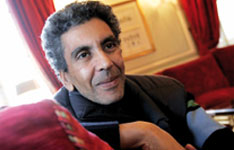
Through both intimate dramas and epic films, in a quarter of a century Rachid Bouchareb has acquired a very central place in French cinema, something that no one could have predicted only a few years ago. From “Cheb” to “Hors la loi”, Bouchareb’s films are nurtured with the same humanist ideal he defends with a constancy that imposes respect.
Fully aware of his difference, Bouchareb has been able through his work, to break free from the “film ghetto” in which most second generation North African film-makers are usually confined in.
Bouchareb used his double culture as an asset to set up an original point of view on displacement, emigration, and those forgotten by History. His originality as a filmmaker is anchored in the imperious desire he feels to drift from one genre to another, from London River, a low-budget film, shot in three weeks with a small crew to Hors la loi, a Hollywood style super-production.
This systematic risk that Bouchareb has taken with his films is also a way for him to assert his freedom as a creator and to avoid any type of categorisation.
This alternation between filmic forms matches his unconditional faithfulness to the ideals he has always borne since “Cheb”. Through the didactics of “Indigènes” and “Hors La Loi”, these great historical frescoes, destined to a wide audience, Rachid Bouchareb, reveals an acute sense of the potential of film as a tool to write History.
Cinema can only become History on condition of being presented as a fable, in other words, with total distance from any attempt at “objective” reconstitution of the past.
That is the intelligence of “Indigènes” and of the victories against oblivion it has made possible.
Tribute to Hiam abbass
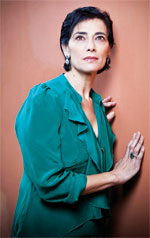
I met Hiam Abbass while I was searching for the actor to play the main character in Satin Rouge. I noticed the face of a tragedian and her acting performance in the film «Vivre au Paradis» by Bourlème Guerdjou, where she was playing a supporting role, that of a committed activist. It wasn’t exactly what I’d been looking for, but I felt that there was something magnetic about her, and that she was strong enough to defend this part that I sensed would be controversial.
I didn’t want to build the character out of emotion, but I did want her to be passionate. Hiam knew how to instill force, fragility and intensity into the character.
The universe of Ghassan SALHAB
Posthumous… ghosts… ruins… the unknown…
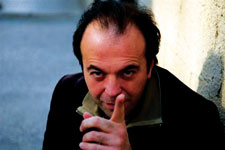 The titles of Salhab’s films show us the constancy of a universe that continues to build itself with a conscience that one might call organic and inevitable.
The titles of Salhab’s films show us the constancy of a universe that continues to build itself with a conscience that one might call organic and inevitable.
Salhab’s existentialist cinema exist at the margins of production institutions, as a constraining modality of the artistic work, as a body of normative precepts, as a commodity.
All of this holds itself in this incessant tide and flow that makes one always close to fading away but never renouncing.
Silhouettes hanging in the air and erratic intervals are expressed in the generic forms of freedom: essays, fragments and notes. Genres where intimacy and l’ecriture du moi come together for concern over the world.
Remember that Ghassen Salhab is the leading figure in new Lebanese cinema. This is true, but at the risk of reducing it to only what the historians give as facts. It is more a poetic effect, a contemplation that gives a piece of work its unique temporality before federating a generation.
Salhab, the agnostic, will certainly excuse our mystic vocabulary but in his universe, the voice takes the place of breath and cinema that of revelation.
HOMMAGE DE LA PRESIDENCE DE L’OFA A ATEYYAT EL ABNOUDY
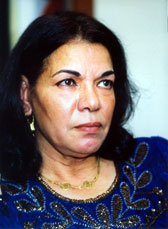
Born in 1939 in Egypt in a village on the Nile delta, Ateyyat el Abnoudy studied law at the University of Cairo. Nothing predetermined a career in film. She makes an attempt at theatre, then studies film at Cairo’s Higher Film Institute. She has immediate success with her first short film, «Cheval de boue» in 1971. She has received more than thirty awards. She then leaves for London to pursue studies in cinema.
So far, El Abnoudy has directed more than twenty-nine documentaries. A pioneer, faithful to the genre, she has never been tempted by fiction. Throughout Egypt, she has filmed bare reality. Her favorite topic is the observation of rural life. Through her films, she becomes the spokeswoman for humble people, poor, but rich with optimism and humanity (Sad Song of Touha, 1972). Her point of view, while realistic, is imbued with poetry. Her camera is always close to the people she films. She observes and questions, without ever judging. It is, without a doubt, due to the quality of her work that UNICEF and UNESCO have often given her their support.
Women feature in a large part of her work. Yet, she cries out loud to those who will listen that she doesn’t make “films about women because she is one, but because she films life and they are part of it”. Often, she portrays women united, capable of shaping their destinies. (Rawya, 1995)
During this 23rd session, Ateyyat al Abnoudy will be meeting film-students. During the tribute paid to her, several films will be shown at universities around Tunis.
